
NATO defends largest buildup in years near Russia's borders

(Vatican Radio) A NATO senior official says the alliance's planned biggest military build-up since the end of the Cold War in especially Eastern Europe is to counter a more aggressive and unpredictable Russia. The announcement by the chairman of NATO's Military Committee came shortly after Moscow summoned a U.S. defense attache this week after American military aircraft allegedly flew into civilian airspace during a reconnaissance mission near Russia's Far Eastern border.
Listen to the report by Stefan Bos:
![]()
Russia's Defense Ministry says the American defense attache was summoned to explain
why a U.S. Air Force RC-135 surveillance plane risked colliding with passenger planes
as it flew over the Sea of Japan on May 22.
Moscow alleged that the plane had turned its transponders off and could not be detected
by civilian radar, although it was flying at an altitude typically used by passenger
jets.
However in turn, Washington has repeatedly accused Russian aircraft of buzzing U.S.
warships and aircraft in what it calls an "unprofessional" and dangerous manner. Russia
says however that the U.S. military should not get too close to its borders.
Despite the already rising tensions, the chairman of the NATO military alliance's
military General Petr Pavel has defended a decision to continue a massive military
buildup closer to Russia's borders in what is known as the NATO's eastern flank.
RUSSIAN ACTIONS
His comments are important as the military committee is NATO's senior military authority
and crucial source of military advice. General Pavel said the buildup is a direct
response to Russian military actions in Georgia, Ukraine, and Syria. "If there was
no increase in Russian assertiveness demonstrated in actions in Georgia, in Ukraine
in Crimea [and] in Syria,
there wouldn't have to be a reaction from NATO's side," he told Radio Free Europe/Radio
Liberty in an interview.
"NATO, and especially NATO's Eastern allies, feel threatened by Russian assertiveness,
Russian aggression in several areas. And especially nations who are directly bordering
Russia wanted to be more assured about NATO's presence and NATO's willingness and
preparedness to act," the general added.
The United States said earlier that it to build up forces in Central and Eastern Europe
in response to Russian intervention in Ukraine where it annexed the Crimean Peninsula.
The West has also accused Russia of supporting pro-Russian separatists in eastern
Ukraine with weapons and troops, charges Moscow denies.
Britain has suggested that NATO's largest build-up since the cold war in eastern Europe
could include up to 3,500 troops near Russia's borders, with Britain, Germany and
the United States taking the bulk of command duties.
| All the contents on this site are copyrighted ©. |


